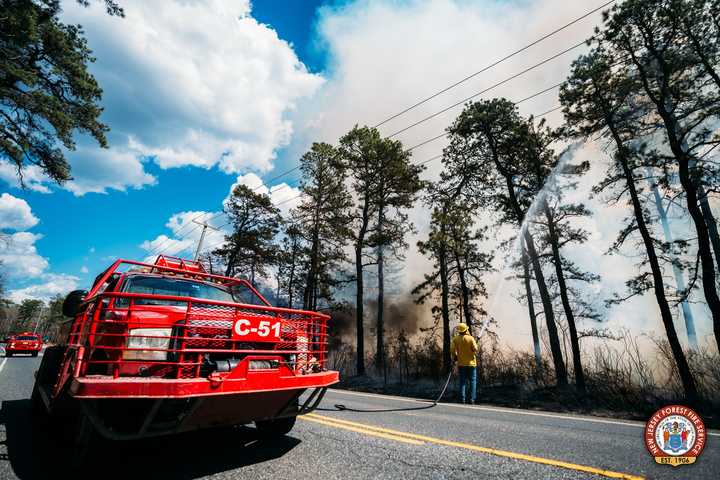The Stage 3 restrictions prohibit all fires unless they are contained in an elevated stove using only propane, natural gas or electricity, according to the Department of Environmental Protections, which mandated Stage 3 fire restrictions earlier this week.
No wood or charcoal fires are allowed, and the use of kerosene or gas torches of any kind is prohibited during the Stage 3 restrictions. The fire ban is in place on all public lands and private properties in all municipalities throughout the state.
As of press time, a 77-acre wildfire that broke out last week in Morris County was 90% contained, the NJ Forest Fire Service said.
The next several days are critical as wind gusts are forecast in excess of 20 mph with very low humidity, the DEP said. In response, the Forest Fire Service has contracted additional aerial resources capable of dropping 600 gallons of water at a time to stage in the event of a wildfire.
Observers in fire towers across the state were watching for any signs of wildfires, while measuring weather readings daily that include temperature, humidity, along with a drought index, which has indicated unprecedented dry conditions. This has raised concern about the potential rapid spread of wildfires in the state.
“We are currently experiencing some of the driest conditions ever, making our forests, in particular, the sprawling Pinelands region of southern New Jersey, especially vulnerable to wildfires that could spread very quickly and threaten property,” Commissioner Shawn LaTourette said. “It is critical that members of the public be extra cautious about fire prevention and refrain from using any open flames.”
New Jersey is also under a statewide drought watch, which was issued on Oct. 17. Residents and businesses are strongly urged to conserve water as persistent dry and warmer-than-average conditions continue to stress the state’s water supplies.
During the past three months, New Jersey has experienced significantly below-average rainfall, which has contributed to diminished streamflow, reservoir, and groundwater levels.
The declaration of a Drought Watch is intended to increase public awareness and appreciation of the stress water supply sources are facing and encourages the public to practice voluntary water conservation measures. If conditions do not improve, declaration of a Drought Warning or a Drought Emergency with mandatory water use restrictions may become necessary.
The last Drought Watch in New Jersey was in August 2022 and was lifted in December 2022. The last statewide Drought Emergency with mandatory water use restrictions was declared in March 2002 and was lifted in January 2003.
Click here to follow Daily Voice Hackensack and receive free news updates.
